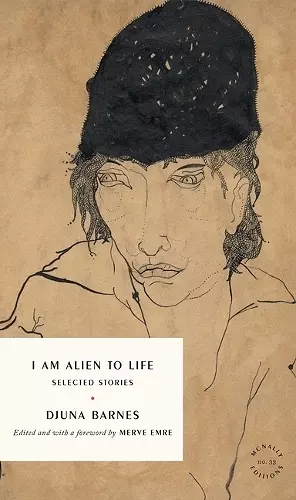I Am Alien to Life
Selected Stories
Format:Paperback
Publisher:McNally Jackson Books
Published:18th Nov '24
Should be back in stock very soon

Djuna Barnes is rightly remembered for Nightwood, her breakthrough and final novel: a hallmark of modernist literature, championed by T. S. Eliot, and one of the first, strangest, and most brilliant novels of love between women to be published in the twentieth century. Barnes’s career began long before Nightwood, however, with journalism, essays, drama, and satire of extraordinary wit and courage. Long into her later life, after World War II, when she published nothing more, it was her short fiction above all that she prized and would continue to revise. Here are all the stories Barnes sought to preserve, in the versions she preferred, as well as a smattering of rarities as selected by critic and New Yorker contributor Merve Emre. These are tales of women “‘tragique’ and ‘triste’ and ‘tremendous’ all at once,” of sons and daughters being initiated into the ugly comedy of life, monuments all to a worldview singular and scathing. As Emre writes in her foreword, “[Barnes’s] themes are love and death, especially in Paris and New York; the corruption of nature by culture; the tainted innocence of children; and the mute misery of beasts . . . her characters may be alien to life, but they are alive - spectacularly, grotesquely alive.”
“Like a dark lesbian genius rolling in a giant heap of damp, dead leaves.”
—Eileen Myles
“The great achievement of a style, the beauty of phrasing, the brilliance of wit and characterisation, and a quality of horror and doom very nearly related to that of Elizabethan tragedy.”
—T. S. Eliot
“Barnes's prose is the only prose by a living writer which can be compared with that of Joyce, and in one point it is superior to his: in its richness in exact and vivid imagery ... A style which is inevitable and inventive at the same time.”
—Edwin Muir
“Djuna Barnes's 1920s and ’30s Paris is on the cusp of leaving behind forever the haute world of Henry James, taken from Proust. That is a world where the better people dine in the Bois, and where open horse-drawn carriages still circle the park . . . Humans suffer and, gay or straight, they break themselves into pieces, blur themselves with drink and drugs, choose the wrong lover, crucify themselves on their own longings and, let's not forget, are crucified by a world that fears the stranger—whether in life or in love.”
—Jeannette Winterson
“Djuna Barnes is a writer of wild and original gifts . . .To her name there is always to be attached the splendor of Nightwood, a lasting achievement of her great gifts and eccentricities—her passionate prose and, in this case, a genuineness of human passions.”
—Elizabeth Hardwick
“Her themes are love and death, especially in Paris and New York; the corruption of nature by culture; the tainted innocence of children; and the mute misery of beasts . . . her characters may be alien to life, but they are alive—spectacularly, grotesquely alive.”
—Merve Emre, from the foreword
“The high priestess of modernism emerges in dark lyrical tales of disaffection and alienation. With their cosmopolitan settings and points of view, Barnes's mature work displays all the ambiguity, world weariness, and cynicism that distinguish Nightwood (1936), her dense, elusive modern masterpiece.”
—Kirkus Reviews
“Barnes writes of her characters as if they were animals in the pages of a biology textbook, suddenly appearing in a dictionary of Greek gods . . . People are the worshipped or despised creations of a harsh mind. They become things with properties, diseases with symptoms, almost: they are made mythical as we read.”
—Gaby Wood, London Review of Books
“Barnes has gone beyond Mrs. Woolf’s practice of her own theory . . . For Barnes is not even concerned with the immediate in time that fascinated the stream-of-consciousness novelists. In her novel poetry is the bloodstream of the universal organism, a poetry that derives its coherence from the meeting of kindred spirits . . . it is the pattern of life, something that cannot be avoided.”
—Alfred Kazin, The New York Times Book Review
“A cult writer whose melodramatically unhappy life brought her into the Left Bank orbit of expatriate authors ranging from James Joyce to Gertrude Stein, Barnes employed an elliptical, sometimes surrealistic style as an elaborate screen for the autobiographical sources and raw pain that lie behind much of her work.”
—Publishers Weekly
ISBN: 9781961341227
Dimensions: unknown
Weight: unknown
240 pages